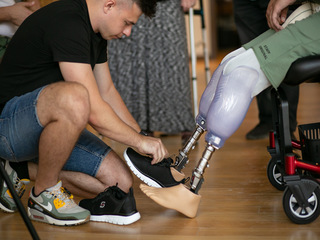 We’re quickly coming up on the one year anniversary of Russia invading Ukraine, and currently over 6,800 civilians have died, including 428 children, while over 10,700 people have been reported to have been injured. According to the Ukrainian Ministry of Social Policy, there are about 12,000 amputees currently registered and awaiting prosthetics.
We’re quickly coming up on the one year anniversary of Russia invading Ukraine, and currently over 6,800 civilians have died, including 428 children, while over 10,700 people have been reported to have been injured. According to the Ukrainian Ministry of Social Policy, there are about 12,000 amputees currently registered and awaiting prosthetics.
Protez Foundation was founded specifically to help that last group: it’s a non-profit that provides free quality prosthetics and rehabilitation to Ukrainian children, soldiers and civilians in the US who have lost their limbs during the war. “Protez” means “prosthetics” in Ukrainian and Russian.
The goal is also to show US support in this difficult time for Ukraine, and to show American society the injured people behind the bombed buildings, Dr. Yakov Gradinar, certified prosthetist, orthotist, and chief medical director at Protez Foundation, told VatorNews.
“Due to the large number of amputees, the Ukrainian health system is extremely overwhelmed. While the prosthetics field in Ukraine is rapidly growing and improving, it still needs better funding, access to the best technology and modern prosthetic education,” he said.
Now the Foundation is taking the next step and will provide remote care for patients through a newly announced partnership with OneStep, a platform for digital physical therapy using science that turns any smartphone into a clinical-grade motion analysis lab.
By joining forces with OneStep, Protez patients will have access to advanced software that will show them the success of their gait progress.
“We didn’t have something similar like this before to be able to track gait progress. It’s even more valuable to be able to track the gait progress of Ukrainians here in the US during fitting, so when patients go back to Ukraine they can follow-up and compare with the baseline when they are 5,000 miles away, especially when they are going back to the front lines,” Gradinar explained.
“It helps us monitor that patients are walking well and don’t develop gait deviations. If they do, then we know that we need to get them to our service center in Ukraine for follow-up and adjustment. It improves overall patient care.”
The Foundation currently has more than 600 applications submitted and before the end of the year, it will have helped over 30 Ukrainians in need of a prosthetic, though the goal it to help between 10 and 30 people a month get a prosthetic.
“We are already seeing success stories, when a patient runs or walks with the app and gets a better score than before and his face lights up and he feels that he is returning back to normal life. When I track my walk score as a non-amputee and it is lower than an amputee. That is an extremely great achievement for our Foundation,” Gradinar said.















